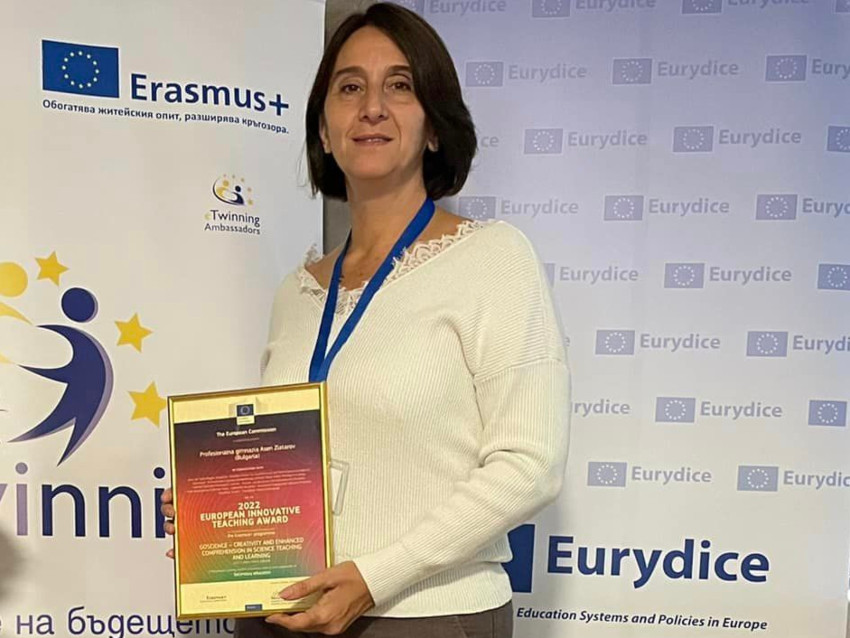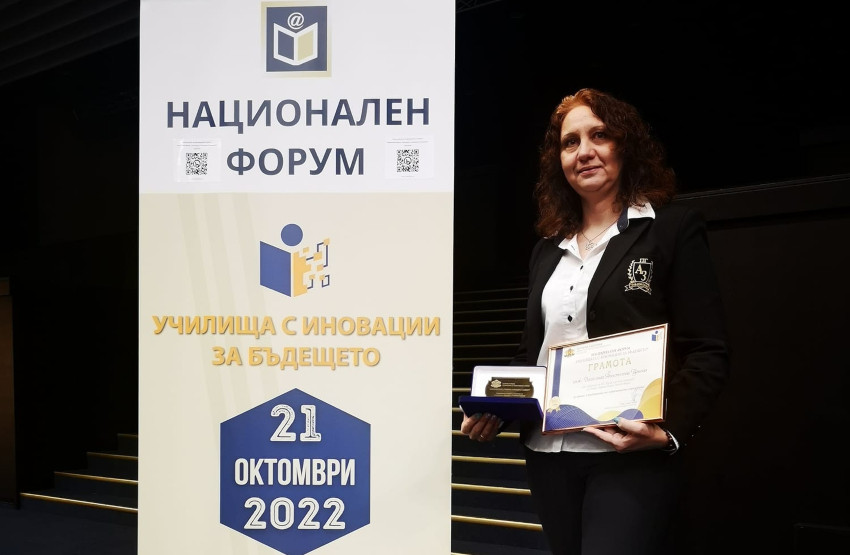We usually talk about northwestern Bulgaria as the poorest region, not just in this country, but also in the whole of EU. However, it turns out that in the most important sphere for the progress of a society, events are taking place that in the long term can contribute to the development of the region and to its transformation into a prosperous one. The time has come when new methods should enter the classrooms and education should be freed from existing stereotypes, as good examples in the sphere show.
The professional high school "Prof. Dr. Asen Zlatarov" in Vidin received two awards for innovative education - the European award in the "Secondary Education" section and the award of the Ministry of Education. The high school is one of the 542 innovative schools in this country that have introduced new curricula and teaching methods.
"The European award we received is related to the teaching of sciences - physics, chemistry, biology, mathematics, in a way that the children can grasp", Marieta Georgieva, head of the high school, said. For this purpose, the school has developed a platform offering a different way of explaining the scientific concepts "through things that the students know, that they touch, that are around them."

The high school introduced the so-called combined lessons integrating three subjects for a day. For example, in order to understand what ecology is, students study seemingly incompatible disciplines such as electronics, chemistry and physical education together.
"The children leave the Baba Vida fortress with the task of taking materials from the river, from the soil, to see what is happening around them in nature,” says Marieta Georgieva. “During this time, they move, play, exercise and measure the oxygen level in their organism and the influence of various factors. When they get to school, they look at the subject from a chemistry perspective and finally, using their skills in electronics, build a device that measures the fine dust particles in the atmosphere.”
One of the important subjects taught in the high school at the moment is "Communication and learning skills", through which skills are built for communication, for teamwork, for various types of communication,” Marieta Georgieva says. In general, these are skills that help you to plan your own development and know how to move along the path to the implementation of this plan.
Having a vision of how to change and improve applies even more to teachers because they are the ones who stimulate students to learn in a new way. Desislava Tsokova is one of these inspiring teachers in the Professional High School "Prof. Dr. Asen Zlatarov" in Vidin, who received the award of the Regional Directorate of Education for significant contribution to innovations.
"Actually, every teacher is an innovator, because generations, ways of thinking, environments change, and in order to be able to pass on knowledge to students, teachers also need to change," she says and gives an example of how, with the help of imagination, one can create a mixture of chemistry, economics and physical education.
"Students were divided into teams that had to build a company producing a cosmetic product with natural ingredients,” Desislava Tsokova says. “They then had to raise capital and procure the funds by participating in relay games. With the money they earned, they had to buy the materials they needed, encoded in a price list containing chemical formulas or definitions. This way they realize that knowledge is very important when they have to work and make the right decisions.”

This school year, the Primary School "Vasil Levski" in the town of Valchedrum is also an innovative school.
"Our innovation is called ‘Business for everyone - the mission is possible,’" head of the school Kamelia Ridzholska says. “In it, we focus on constant adaptation to changes in modern society, because we work with students from vulnerable groups and our goal is to give all our children a chance on the labor market. The activities will include not only teachers, but also parents and representatives of various professions and businesses, who will make students familiar with the essence of their activity, making a connection between the knowledge learned at school and real life."
However, in order to achieve a real change in education, a legislative change is necessary, Marieta Georgieva says and adds:
"What we call today innovation will not be able to happen in this regulatory environment,” she says. “The law must be changed. If there is no sustainability, no predictability, no clear perspective, the system creates the feeling that you don't need to do anything, because tomorrow someone for some obscure reason will come up with something different. But I am glad that we still have a chance to give way to innovative education and this means that we are on the right track and moving in the right direction.”
Text: Diana Tsankova /based on interviews by BNR Vidin/
English: Al. Markov
Photos: Facebook/ Professional high school "Prof. Dr. Asen Zlatarov" in VidinOn February 16, Radio Bulgaria celebrates its 89th anniversary . Throughout these years, our multilingual media has been not only a channel of information, but also an invaluable link with our audience around the world. Today, Radio Bulgaria offers rich..
At various times in its existence, the BNR's Directorate of Foreign Language Broadcasts, now known as Radio Bulgaria, the multimedia multilingual platform of Bulgarian National Radio, was more than just a workplace for a number of popular journalists...
February 16, 2025 marks the 127th anniversary of the first bulletin of the Bulgarian Telegraph Agency, signed by its first director Oscar Iskander. The agency was established in 1898 by a decree of Prince Ferdinand I. Just like 127 years ago, today the..
The first Dalmatian Pelican of this season hatched a few days ago in the protected area Kalimok - Brushlen near the Danube town of Tutrakan, reports the..
More than 4,000 participants from 52 masquerade groups from all over the country will take part in the Jamala National Masquerade Festival in Kyustendil on..
On February 16, Radio Bulgaria celebrates its 89th anniversary . Throughout these years, our multilingual media has been not only a channel of information,..

+359 2 9336 661
